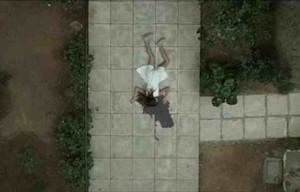This short review appears on The Upcoming website here.
 In 1997, Michael Haneke made a
psycho thriller called Funny Games that exhorted the audience to leave
the cinema and then told those who remained that they were responsible for the
crimes onscreen. Then in 2009, Yorgos Lanthimos made Dogtooth, a film
that seemed to be cashing-in on the Josef Fritzl scandal (though the script was
written before the story came out) but which primarily blamed the family and
the façades of bourgeois normality that we all put up. Now comes Alexandros
Avranas’ Miss Violence, which deals with suicide, incest and paedophilia
but without any real intellectual weight or compassion for the victims. And as
always, the complacent viewer and the bourgeois lifestyle are the real
villains.
In 1997, Michael Haneke made a
psycho thriller called Funny Games that exhorted the audience to leave
the cinema and then told those who remained that they were responsible for the
crimes onscreen. Then in 2009, Yorgos Lanthimos made Dogtooth, a film
that seemed to be cashing-in on the Josef Fritzl scandal (though the script was
written before the story came out) but which primarily blamed the family and
the façades of bourgeois normality that we all put up. Now comes Alexandros
Avranas’ Miss Violence, which deals with suicide, incest and paedophilia
but without any real intellectual weight or compassion for the victims. And as
always, the complacent viewer and the bourgeois lifestyle are the real
villains.
On the day of her birthday,
eleven year-old Angeliki (Chloe Bolota) commits suicide by wordlessly jumping
out of a window during the family celebrations. The rest of the family –
including the domineering Father (Themis Panou) and the silent mother Eleni
(Eleni Roussinou) – claim not to know why she did this horrible thing, but as
the film plays out, the horrors of this dysfunctional family are laid bare.
The film builds slowly following
the suicide. We are invited into this family’s home (the film begins with a
door opening and ends with a door being locked to emphasise our entry into a
very private world) and we slowly notice certain incongruities and oddities.
Father is strict and abusive and the film is ultimately about control and how
everyone loses when someone enforces their will.
But the film is hopelessly
misguided. Avranas tells the story with long, steady takes, the look of
intellectual cinema, but it seems like a gesture. The film seems little more
than a series of shock tactics intended only to enhance the director’s
international reputation – a gambit doubly successful when one considers the
film’s two top awards from the Venice Film Festival. There is no intellectual
weight to match the intellectual look, only surface imitations of previous
films. Characters stare out at the audience to suggest their complicity in
moments straight out of Funny Games and the director’s insistence that
the victim is as violent as the victimiser is a ridiculous statement badly
made. Add to this the heartless, exploitative representations of abuse and we
have an incredibly stupid film that is little more than an exercise in cynical
cruelty.
No comments:
Post a Comment